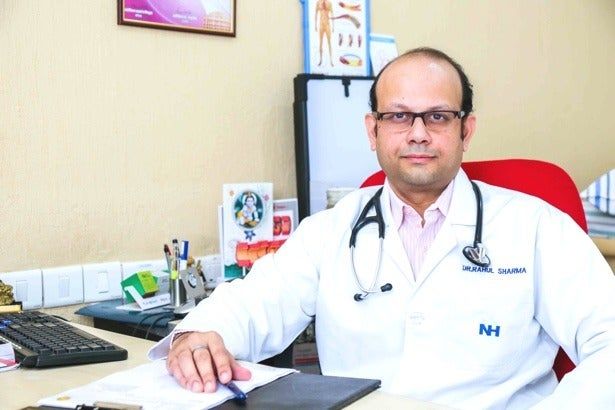Understanding Mild Coronary Heart Disease: Symptoms, Diagnosis & Management
Coronary Heart Disease (CHD) is a condition where the coronary arteries—vital blood vessels supplying oxygen-rich blood to the heart—become narrowed due to plaque buildup. When this narrowing is mild, it is referred to as Mild Coronary Heart Disease. Though not immediately life-threatening, it serves as an early warning sign that requires lifestyle changes, monitoring, and sometimes medical intervention.
For anyone seeking early diagnosis and preventive care, consulting a trusted cardiologist in Jaipur like Dr. Rahul Sharma can make all the difference. Early treatment significantly reduces the risk of progression and major cardiac events.
What is Mild Coronary Heart Disease?
Mild CHD occurs when there’s slight to moderate blockage (typically less than 50%) in the coronary arteries. At this stage, symptoms might be subtle or completely absent. However, this does not mean the condition can be ignored. Left untreated, mild CHD can worsen, leading to severe heart complications, including heart attacks.
Symptoms of Mild Coronary Heart Disease
In many cases, mild CHD is silent. But some individuals may begin to notice warning signs:
- Mild chest discomfort or tightness (especially during exertion)
- Fatigue or shortness of breath
- Mild palpitations or irregular heartbeats
- Lightheadedness
- Reduced stamina during physical activity
If you experience any of these, schedule an appointment with a heart doctor in Jaipur for a thorough evaluation.
Who is at Risk?
Several risk factors contribute to the development of CHD:
- High blood pressure
- High cholesterol levels
- Diabetes
- Obesity
- Sedentary lifestyle
- Smoking and alcohol use
- Family history of heart disease
- Stress and poor sleep
Understanding these risk factors is key to managing mild CHD. A qualified heart specialist in Jaipur can help develop a personalized plan based on your unique profile.
Diagnosis of Mild CHD
Early detection is crucial. If mild CHD is suspected, your cardiologist may recommend the following diagnostic tools:
- Electrocardiogram (ECG): Checks for abnormal heart rhythms
- Echocardiography: Visualizes heart structure and function
- Treadmill Stress Test (TMT): Evaluates how your heart responds to exercise
- CT Coronary Angiography: Provides detailed imaging of the coronary arteries
These non-invasive tests can help in identifying even the earliest signs of coronary artery narrowing.
Lifestyle Modifications: The First Line of Defense
When diagnosed with mild coronary heart disease, the first step is adopting a heart-healthy lifestyle. Here are some recommendations:
- Heart-Friendly Diet: Include whole grains, lean proteins, fruits, vegetables, and healthy fats (like nuts and olive oil). Reduce salt, sugar, and saturated fats.
- Exercise Regularly: Aim for 30 minutes of moderate-intensity activity at least five times a week. Walking, swimming, and yoga are excellent choices.
- Quit Smoking: Tobacco is a significant contributor to arterial plaque buildup.
- Limit Alcohol: Excess alcohol intake increases blood pressure and triglyceride levels.
- Manage Stress: Practice meditation, deep breathing, or hobbies that relax the mind.
Dr. Rahul Sharma, a renowned cardiologist in Jaipur, provides expert guidance on creating sustainable lifestyle plans.
Medical Management
While lifestyle changes are essential, some patients may also need medications to control risk factors and symptoms. These may include:
- Statins: To lower LDL cholesterol
- Beta-blockers: To reduce heart rate and blood pressure
- Aspirin: To prevent blood clots (only if recommended)
- ACE inhibitors: To manage blood pressure and heart function
Your heart doctor in Jaipur will carefully tailor medications based on your age, medical history, and risk level.
Monitoring and Follow-Up
Mild CHD doesn’t always require surgical intervention, but regular monitoring is essential. Routine follow-ups with your heart specialist in Jaipur help track your progress and make necessary adjustments in treatment.
When to Worry?
If symptoms become more frequent, severe, or appear at rest, seek immediate medical attention. Sudden chest pain, shortness of breath, or dizziness could indicate progression to moderate or severe CHD.
Why Early Action Matters
Taking action during the early stage of coronary disease prevents complications and improves your quality of life. With early detection, consistent monitoring, and the right lifestyle, many individuals live long and active lives.
Choose the Best Cardiologist in Jaipur
Dr. Rahul Sharma is a highly experienced cardiologist in Jaipur with over 20 years of experience in diagnosing and managing all stages of heart disease. His evidence-based approach and compassionate care make him a trusted heart specialist in Jaipur for patients across Rajasthan.
Key Treatments Offered:
- ECG, 2D Echo, and Stress Tests
- Coronary Angiography
- Coronary Angioplasty
- Pacemaker Implantation
- Heart Failure Management
- Preventive Cardiology
Contact Information:
Clinic: Medinova Superspeciality Clinic, H-7, Janpath, Shyam Nagar, near Dana Pani Hotel, Sodala, Jaipur
Hospital: Fortis Escorts Hospital, Jaipur
Phone: 916376993553
Email: docrahulsharma@gmail.com
Final Thoughts
Mild Coronary Heart Disease is a critical early stage that offers a golden opportunity for reversal and prevention. By addressing the condition early with expert care from a reliable heart doctor in Jaipur, you can lead a full and healthy life. Don’t ignore the subtle signs—your heart deserves proactive care.

